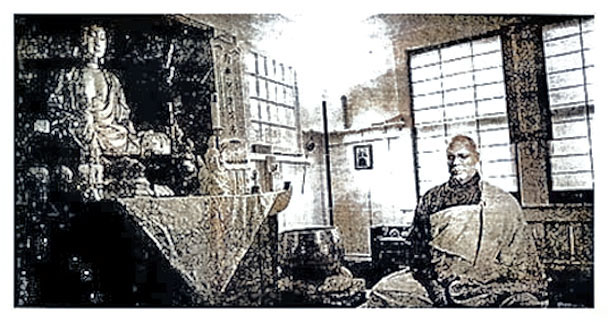|

Rev.
Kusala Bhikshu is the second Buddhist police chaplain in the
U.S.
The
LA Times, Tuesday, January 16, 2001
Police Chaplain Program Is Keeping Many Faiths
Religion: Garden Grove fields a highly
diverse group, including a Buddhist and Muslim.
By WILLIAM LOBDELL, Times Staff Writer
After Garden Grove's newest
police chaplain puts on his bulletproof vest, he stuffs two
items into the pocket centered over his heart: an extra slice
of body armor to protect against a kill shot, and a photo
of Kwan Yin, as beloved by Buddhists as the Virgin Mary is
by Catholics.
"Using both the Kevlar and Kwan
Yin, I thought that was the way to go," the Rev. Kusala Ratana
Karuna said. "You can never have too much protection."
Kusala, 51, a Buddhist monk,
is one of two new recruits in the Garden Grove Police Department's
cutting-edge chaplain program. The 10-member volunteer force
also includes a Muslim, a Mormon, a rabbi, pastors and priests.
Few if any police departments
nationwide can match Garden Grove's diversity of faith. Kusala
is only the second Buddhist police chaplain in the United
States, according to the International Conference of Police
Chaplains. The other is in Rockford, Ill., where the Police
Department has some Buddhist officers.
A major driver behind the yearlong
revamp was Police Chief Joe Polisar's desire to form better
relationships with immigrant communities, some of which often
are distrustful of the police.
Garden Grove's population of
160,000 is divided about evenly among Asians, Latinos and
whites. The city is home to Buddhist temples, synagogues,
one of the nation's largest mosques, and churches, including
the Crystal Cathedral.
On call 24 hours a day, the
chaplains traditionally have given advice or provided a shoulder
to cry on for police officers, their families, crime and accident
victims, and troubled citizens such as runaways. In Garden
Grove, they will be ambassadors in the diverse neighborhoods.
"We can now bridge those gaps
that we haven't been able to until now," said Lt. Scott Hamilton,
who is in charge of the program. "We've just never before
had direct lines of communication with those groups."
Kusala, who came on board last
month, spent his first police ride-along visiting four Buddhist
temples in the city.
Haitham "Danny" Bundakji, the
department's first Muslim chaplain, is less than a month into
the job. He already has responded to a 4 a.m. call to help
a young Muslim whom police deemed suicidal.
"He was in really bad shape,"
Bundakji recalled. "I told him that harming himself or anybody
else is totally against Islam. I've talked with him a lot
since then."
Word Spreads Among Muslims
The Islamic Society of Orange
County in Garden Grove draws 2,000 worshipers to Friday prayer
services. News that they now have a police chaplain spread
quickly in the tightknit Muslim community.
"Some are very excited and very
surprised. That term 'chaplain' is very new for them," said
Bundakji, who added that in his new role, he received nine
calls last week for assistance.
Chaplain programs within police
departments have been steadily growing for more than a decade,
said Stu Nelson, assistant executive director of the International
Conference of Police Chaplains. The chaplains' association
has added 100 chaplains a year in the last 12 years, Nelson
said, and now have 2,500 increasingly diverse members in nine
countries.
The faith leaders in Garden
Grove are subjected to background checks and training sessions.
The chaplains are instructed to use a nondenominational approach,
keeping clear of evangelizing. Even the dress suggests uniformity:
black jeans, bulletproof vest, black shirt, black jacket and
baseball cap.
Kusala and Bundakji were personally
recruited by Polisar, who met them at community events. Both
were selected for their ability to jump easily between the
police officers' world and the immigrant community: Kusala,
as an American-born monk and Bundakji as a well-respected
spokesman for the Muslim community.
Kusala, became a monk later
in life. He never thought he would be affiliated with law
enforcement, but admits he was a big fan of the TV show "Cops."
When Polisar first proposed
revamping the chaplain program, officers' reaction was underwhelming.
"This did not come about without
a great deal of discussion, concern and consternation," Polisar
said. "To the officers' credit, once we got into the discussion,
they were open to it. The chaplains themselves were the best
sellers."
The officers worried that a
new religion was going to be pushed on them. They were unsure
of what to expect from a Buddhist monk.
"When you start talking about
people's faith, things can be very, very volatile," Hamilton
said. "Once the idea sunk in a little bit--that there was
going to be a liaison to the [immigrant] communities--they
were excited."
The new breed of chaplain also
helps educate the American-born police officers, who know
little about Islam or Buddhism.
Patrol Car as a Confessional
"They ask me all sorts of questions,"
Kusala said. "Like everyone asks me: 'Do Buddhists go to heaven?'
Kusala explained the difference
between nirvana and heaven: "Buddhists go to heaven by what
they think, what they say, and what they do--which is their
karma. Eventually, they will end up in nirvana."
Kusala said he hopes that he
eventually will gain enough trust to teach the officers meditation.
As the chaplains gain the officers'
confidence, a ride-along can turn the inside of the police
car into a confessional--or a psychologist's office.
"We have a lot of young officers,
and they see a lot of things," said Steve LaFond, a Mormon
chaplain.
"They're supposed to be real macho, but no one's that tough.
I don't care who you are, when you see a SIDS [Sudden Infant
Death Syndrome] baby, it affects you.
"They won't ever go to a psychologist,
but they'll spill their heart and soul to a man or woman of
the cloth."
|